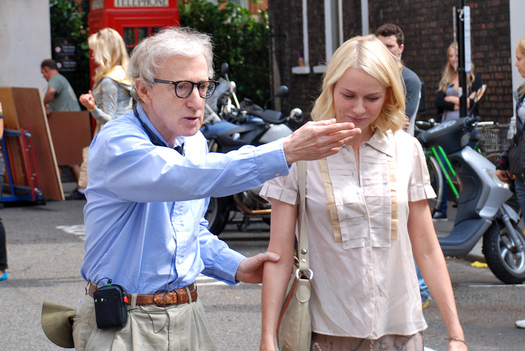
Woody Allen and Naomi Watts on set. PHOTO: edavidove
Sometimes we can learn the most from master practitioners in fields different from our own.
Robert Weide’s superb documentary on the writer/director/actor Woody Allen for the PBS American Masters series offers a treasure trove of wisdom that transcends the film industry. Allen’s movie-making process in particular offers three insights that have application to anyone who leads a creative enterprise or manages a creative process.
First, he hires only the best actors — and fires them as soon as he feels they aren’t working out. Beyond stating the obvious that the hiring process is serious business, the practice of hiring successfully can only occur when not performed under duress. Too often fast growing organizations focus on putting bodies in seats to carry out near-term tasks, and ignore the more enduring needs that support long term organizational health. All the best intentions to hire smartly and even a track record in doing so is still no guarantee that everyone will work out; hiring is an imprecise art because, after all, it involves human beings. In situations where things cannot be remedied it’s important to make the decision to let someone go fairly but swiftly — being clear why the job that was agreed to wasn’t being performed satisfactorily. Movies, like most creative outputs, require an ensemble of individuals to craft a successful product. Or in the words of business writer Jim Collins, you’ve got to make sure that you’ve got the right people (or potential Oscar nominees) on the bus.
Second, he only lets the actors read the script overnight — then tells them they can change any lines they want. A memorable scene in the documentary shows a courier delivering a manuscript in a plain manila envelope to an actor’s front door, and then promptly showing up again the next morning to retrieve it. While this may very well be a way to protect trade secrets and maintain control, it’s also a way of sharing a vision for the project. With this established, the actors can be invited to collaborate on the process of improving the product that is consistent with that vision; they are members of the team, not just employees carrying out their respective roles. The science of organizational behavior has demonstrated that enabling individuals to think and behave like ‘owners’ is one of the more powerful incentives for delivering great results. And being inspired enough to improvise and ‘build on the ideas of others’ (in brainstorming parlance) is really only viable when the direction for the effort has been clearly communicated in the first place.
Third, he gives the actors almost no direction on the set — he assumes that they are good at their jobs and that he should just stay out of their way. This harks back to the first point – if you’ve been thoughtful about bringing the right people on board, establishing a productive work environment, and communicating your vision (the second point), you should be confident that your team(s) can do their job. It’s a process grounded in trust, and eliminates the need for micro-management. Being adept at this probably has something to do with knowing your staff and empathizing with their particular needs (Allen is an actor too), whether those needs are focused on professional development or artistic self-expression.
I’ve always viewed creative leadership as a sort of cycling pace line — sometimes you’re leading from the front, setting the tempo for others to follow, and then you move to the back to let others temporarily take over. This rhythm is repeated multiple times during the cycling journey. But I’m mixing metaphors. Let’s just say that there are at least three reasons why Woody Allen has enjoyed a distinguished career spanning five decades. Whether you like his product or not, he’s followed a consistent approach that has yielded some pretty remarkable results.
